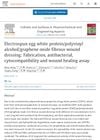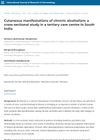 35 citations,
May 2015 in “Arquivos De Gastroenterologia”
35 citations,
May 2015 in “Arquivos De Gastroenterologia” Women with PCOS are more likely to have fatty liver disease and worse metabolic health.
[object Object]  14 citations,
January 2020 in “Biomaterials Science”
14 citations,
January 2020 in “Biomaterials Science” Created microspheres show potential for safe and effective use in prostate artery embolization.
 10 citations,
February 2023 in “Colloids and surfaces. A, Physicochemical and engineering aspects”
10 citations,
February 2023 in “Colloids and surfaces. A, Physicochemical and engineering aspects” Adding 1 mg/ml of graphene oxide to egg white protein wound dressings improves antibacterial properties and supports skin repair.
 2 citations,
April 2022 in “African Health Sciences”
2 citations,
April 2022 in “African Health Sciences” The Fatty Liver Index (FLI) may not be enough to rule out non-alcoholic fatty liver disease in lean women with polycystic ovary syndrome.
 1 citations,
October 2016 in “International Journal of Research in Dermatology”
1 citations,
October 2016 in “International Journal of Research in Dermatology” Chronic alcoholics most commonly experience skin infections.
 January 2025 in “Regenerative Biomaterials”
January 2025 in “Regenerative Biomaterials” The hydrogel helps reduce scarring and improve wound healing by releasing salvianolic acid B in acidic conditions.
 November 2022 in “International Journal of General Medicine”
November 2022 in “International Journal of General Medicine” Women with Polycystic Ovary Syndrome are more likely to have Non-Alcoholic Fatty Pancreas Disease, which is associated with older age, metabolic syndrome, insulin resistance, and high male hormone levels.
 May 2019 in “The Journal of Sexual Medicine”
May 2019 in “The Journal of Sexual Medicine” Drinking alcohol before taking flibanserin does not increase the risk of severe low blood pressure or fainting.

Pimpinella anisum L. extract significantly boosts hair growth in mice.
 80 citations,
June 2008 in “Biomaterials”
80 citations,
June 2008 in “Biomaterials” EVAL membranes help create cell structures that can regrow hair follicles.
 50 citations,
May 2011 in “Journal of Ethnopharmacology”
50 citations,
May 2011 in “Journal of Ethnopharmacology” Eclipta alba extract shows potential as an anticancer agent by inhibiting cancer cell growth and promoting cell death.
 38 citations,
April 2018 in “Psychopharmacology/Psychopharmacologia”
38 citations,
April 2018 in “Psychopharmacology/Psychopharmacologia” Blocking CRF-R1 can reduce alcohol intake in stressed mice.
 32 citations,
February 2014 in “Psychopharmacology”
32 citations,
February 2014 in “Psychopharmacology” Dutasteride makes alcohol less sedating and may lead to less drinking in men.
11 citations,
January 2018 in “IET Nanobiotechnology” The scaffolds significantly sped up wound healing in dogs and were safe.
September 2024 in “Journal of the American Academy of Dermatology”  January 2022 in “Pharmaceutical Sciences Asia”
January 2022 in “Pharmaceutical Sciences Asia” The extract from Clitoria ternatea flowers helps human skin cells grow and promotes hair growth in mice.
1 citations,
October 2018 in “InTech eBooks” Ethosomes are a promising method for treating hair loss by delivering drugs directly to the scalp.
 April 2024 in “International Journal of Dermatology”
April 2024 in “International Journal of Dermatology” Oral minoxidil may worsen hangover symptoms when combined with alcohol.
11 citations,
January 2020 in “Engineered science”  3 citations,
August 2016 in “Behavioural Brain Research”
3 citations,
August 2016 in “Behavioural Brain Research” Finasteride given to baby rats reduces dopamine release and increases alcohol consumption in adult males.
2 citations,
June 2018 in “Physiology & behavior” Early changes in brain chemicals affect how a drug reduces alcohol intake in rats.
1 citations,
August 2012 in “Journal of Emerging Trends in Engineering and Applied Sciences”  August 2023 in “The journal of investigative dermatology/Journal of investigative dermatology”
August 2023 in “The journal of investigative dermatology/Journal of investigative dermatology” People with certain skin disorders are more likely to have alcohol problems, especially if they also have mental health issues like depression and anxiety.

Men with depression and marijuana usage are more likely to be treated for lower urinary tract symptoms/benign prostatic hyperplasia.
 April 2020 in “Dermatology and therapy”
April 2020 in “Dermatology and therapy”  38 citations,
March 2010 in “Medicine”
38 citations,
March 2010 in “Medicine” Most patients with Porphyria Cutanea Tarda had skin blisters and were often affected by hepatitis C and alcohol abuse, with differences between familial and sporadic cases.
[object Object]  34 citations,
April 2014 in “Psychopharmacology”
34 citations,
April 2014 in “Psychopharmacology” Stress and alcohol affect brain chemicals differently in rats, mice, and humans, influenced by genetic differences.
 34 citations,
November 2011 in “Alcoholism: Clinical and Experimental Research”
34 citations,
November 2011 in “Alcoholism: Clinical and Experimental Research” Three drugs change mice's alcohol drinking patterns by affecting GABAA receptors.
 29 citations,
July 2004 in “Pharmacology, Biochemistry and Behavior”
29 citations,
July 2004 in “Pharmacology, Biochemistry and Behavior” Finasteride reduces alcohol withdrawal effects, especially in female mice.
 21 citations,
June 2005 in “Alcoholism: Clinical and Experimental Research”
21 citations,
June 2005 in “Alcoholism: Clinical and Experimental Research” Finasteride reduces alcohol withdrawal severity and anxiety in mice, but may increase withdrawal severity in some cases.
























